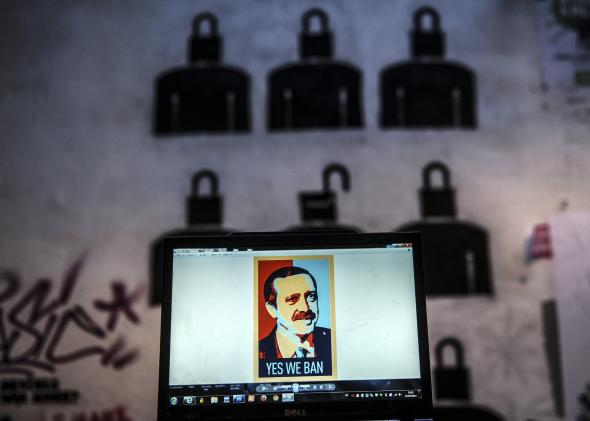Netizen Report: Turkey’s Telecom Authority Acquires Absolute Power Over Internet Content

Photo by OZAN KOSE/AFP/Getty Images
The Netizen Report originally appears each week on Global Voices Advocacy. Hae-in Lim, Lisa Ferguson, Ellery Roberts Biddle, and Sarah Myers contributed to this report.
Global Voices Advocacy’s Netizen Report offers an international snapshot of challenges, victories, and emerging trends in Internet rights around the world. This week’s report begins in Turkey, where the Parliament adopted an amendment to the country’s Internet law that will endow the Telecommunications Directorate with an ostensibly absolute degree of power over online content. Now approved by President Erdogan, the amendment charges the telecom agency with evaluating the political nature of all online content. It’s authorized to instantly block any site that it deems threatening to national security or public order—without oversight by a court or any other government body. The amendment removes from the current (already-restrictive) online content policy a requirement for post-facto judicial approval on content removal requests.
Proposed by the ruling party, the amendment comes several months after a series of voice recordings leaked online revealed corrupt activities of leading government officials, including Erdogan himself. In the immediate aftermath of the scandal, authorities blocked Twitter and YouTube, but these restrictions were later lifted thanks to an order by the Constitutional Court.
A week without thuggery?
Two members of the Global Voices community were granted freedom this week. GV author and former Central Asia editor Alexander Sodiqov, who was arrested while conducting field research in Tajikistan this summer, requested and was granted a return to his home in Toronto, though he formally remains under investigation. Now reunited with his wife and daughter, he plans to continue his studies at the University of Toronto.
Egyptian blogger and leading pro-democracy activist Alaa Abd El Fattah was released from prison on bail following a ruling by the Cairo Criminal Court. Convicted in June of organizing a protest without a permit and harming a police officer, the 32-year-old activist and father had been on a hunger strike since late August, and he planned to end it only when he was released from prison. It is not yet clear whether he plans to continue the strike given that he has been released on bail. A key factor in Abd El Fattah’s release was the decision by the presiding judge in his case to recuse himself from the process.
Abd El Fattah has been jailed or investigated under every Egyptian head of state who has served during his lifetime. In 2006, he was arrested for taking part in a peaceful protest. In 2011, he spent two months in prison, missing the birth of his first child. In 2013, he was arrested and detained for 115 days without trial. Although currently out of state custody and at home with his wife and son, he still will most likely face 15 years behind bars.
Surveillance: Stop scaring us, NSA
The NSA has created a “Google Earth” like map of the Web’s Internet traffic, according to new revelations from the Snowden files. Through the Treasure Map program, the agency seeks to identify and locate every device connected to the Internet, worldwide. The documents include detailed outlines of global communications networks, highlighting those that have been breached by the NSA. The program logo features a skull with glowing red eyes superimposed onto a compass.
In an article for Glenn Greenwald’s news site the Intercept, Edward Snowden revealed that New Zealand developed a system that collects citizens’ electronic communications metadata en masse. Despite the denials of the country’s prime minister, ample evidence from the XKEYSCORE program indicates that the GCSB, New Zealand’s intelligence agency, does indeed engage in mass surveillance of the country’s civilian population. The prime minister’s assurances coincided with the enactment of an Internet surveillance law that gave broader powers to the government for data collection.
Wikileaks released a series of files from leading surveillance technology company Gamma International relating to the spyware FinFisher. The leaks included copies of the software itself.
Free Expression: Is porn filtering a slippery slope to political censorship?
Lebanon made a rare foray into online censorship last week after the minister of telecommunications ordered six pornographic websites blocked by the nation’s Internet service providers, apparently on behalf of the Ministry of Justice. Despite there being little precedent for filtering online traffic, the move sparked fears of more extensive censorship in the future.
East Timor’s Press Law, which was widely regarded by journalists and human rights groups to be a threat to free speech, was declared unconstitutional by the country’s Court of Appeal. The decision left room for legislators to draft and pass a new law, suggesting that debate over the role of media in the country is likely to continue.
Industry: LinkedIn losing connections over censorship in China?
After facing criticism over censorship policies affecting users in mainland China, LinkedIn is having second thoughts. In an effort to appease China’s censors, LinkedIn has been censoring not just what Chinese users can view on the professional networking site, but what they can share with the rest of the world. A LinkedIn spokesperson says the company may change its policy to allow content banned in China to be viewed globally, a strategy similar to Twitter’s “geo-blocking” country-specific approach to government-requested content removal.
Google said government demands for user information increased by 150 percent over the past five years. It released its 10th Transparency Report, which includes government demands for user data related to criminal investigations through the first half of 2014. Google called on the U.S. Congress to enact the USA FREEDOM Act and to update the Electronic Communications Privacy Act to rein in the excessive collection of metadata.
Some Comcast users reported receiving messages from the company that their use of the anonymity-protecting Tor web browser is “illegal,” and that Comcast threatened to terminate their service. Comcast refuted the claims on its blog, dismissing allegations as “totally inaccurate” and stating that its users are free to access Tor without repercussions.
New Research
- “Mapping Digital Media: Global Findings”—Open Society Foundations
Future Tense is a partnership of Slate, New America, and Arizona State University.

